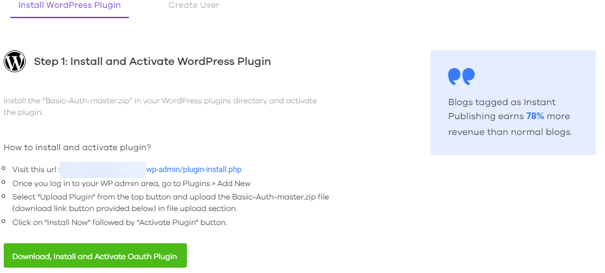With the advent and advancement in growth marketing, has come a surge in the number of ways you can earn money. One of those is the use of sponsored posts.

What are Sponsored Posts?
In a nutshell, a sponsored post is a form of content marketing where advertisers pay to publish their content on a high traffic publication in a way that is consistent with the medium’s regular format.
There are a variety of media with different formats, including blogs, Instagram posts, YouTube videos, and so forth. Sponsored content includes featured promotions and campaigns on these media.
Sponsored posts are also known as advertorials. They have been around for a while but seemed to have always been under-used. A sponsored post finds its place between a blog post and traditional advertisement as it is usually more educational and entertaining than it is promotional. Coupled with the fact that it comes from an influencer, it carries more weight than a traditional advertisement. This influencer can be a prominent individual or a reputable blog or publication.
Why do you need Sponsored Posts?
Sponsored posts are an excellent way for bloggers to make money. Given the value of sponsored posts in this age, you could potentially charge more to have a sponsored post on your blog in comparison to a regular ad.
Many bloggers these days start with the sole purpose of making money. To make this happen, most of them focus on getting significant amounts of traffic to their blog. Doing this alone may not prove to be an effective strategy. As a result, some bloggers supplement this strategy with affiliate marketing.
A sponsored post is a straight-forward and effective method to get new content onto your blog and get paid for it.
Charging for a Sponsored Post
It may be tempting to drum up a random number to charge for sponsored posts. However, it is not as simple as it seems. Before deciding on a rate, it is vital to consider several factors. Here are the main ones: Traffic, social media presence, engagement, podcast downloads, and newsletter open rates.
Each of the above is assigned a specific value. You will have to consider those figures to determine your final sponsorship value.

Flyout
Flyout is a service that ensures you earn money by publishing sponsored content on your blog. Here are some of its primary features:
- It enables you to add your blog and fix the price for each post.
- Flyout allows you to choose the type of content you want advertisers to publish on your blog.
- Advertisers will go through your blogs and choose the one that best suits their requirements.
- Getting real-time parameters, including the number of articles getting published or the number of drafts, impressions, among others, is a breeze. You should have no issues tracking your blog’s performance and make the necessary changes to optimize it.
However, you have to make sure you are familiar with the criteria for blog selection before you proceed with anything else. Here is what you should know:
- You need to have a blog that has a minimum of 10,000 visitors every month.
- Your blog must be accessible and easy to navigate. Be sure to include sections like the About Us section, the FAQ section, Customer Care, Contact Us, and so forth.
- In addition to this, your blog must have a minimum of 100 excellent articles. These articles will be reviewed to verify if they meet Flyout’s standards.
Flyout is particular about the niches it allows on its network. Your blog will not be selected if it falls under the following niches: Exam results & jobs, APK downloads, celebrity wiki, adult, guns and weapons, cannabis, dating & relationships, agencies & portfolios.
How do I list my blog on Flyout?
Follow the given steps to list your blog on Flyout:
- You can register your blog on Flyout from here
- Head to the Flyout Dashboard and log in.
- You will find an ‘Add Website’ option on the top left of the Dashboard. Click on that.
- Add your website URL under the ‘Check Eligibility’ section.
- You can verify your ownership under the ‘Verification’ section. Be sure to add an HTML Meta Tag, DNS Record, or upload an HTML file.
- Once you are done verifying the ownership of your blog, you will need to provide the following information: website URL, contact number, the price per post (in USD), gambling links allowed, and category.
- Be sure to install the JSON API plugin, and then create an author account. Keep in mind that these details have to be precisely the details you have submitted in the ‘Add Website’ section.

Do note that while you can proceed without the JSON API plugin or creating an author account, you will have to manually publish the sponsored posts on your blog. Also, 78% of the advertisers on Flyout select the blogs that are tagged under ‘Instant publishing.’
If your blog does not have an author account or the JSON API plugin, it will not be displayed on the ‘Instant Publishing’ section. You can expect the in-house team to analyze your blog within 72 hours and approve or reject it.
Sponsored Post Offers
Once your blog gets approved, you can expect Flyout to show your blog to its advertisers. Advertisers who are interested in publishing a sponsored post on your blog will make an offer, of which you will be notified under the ‘New offers’ tab.
You can hit ‘View Article’ to check the article and see if you are satisfied with it. If you are, click ‘Accept’ and post it on your blog. If not, you can click on ‘Reject’ and explain why you have decided to reject the article.
Conclusion
As Flyout is free and you can generate extra revenue from your blog without placing any ads. Registering your blog on Flyout can only help generate extra revenue apart from that they also have an affiliate program where you can add extra income if you can invite your friends on the platform. If you want to get see flyout review so you can visit the website because where you’ll get a true review of the flyout.






